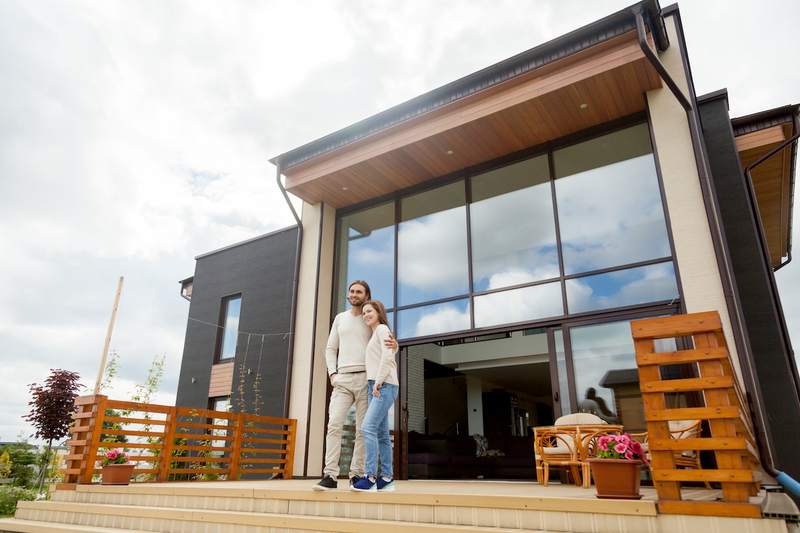For many people, buying a million-dollar home sounds unattainable. But rising home prices mean million-dollar price tags are becoming more common. In June 2023, about 8% of homes in the United States were estimated to be worth $1 million or more.
If you want to buy a million-dollar home, it helps to know what financial resources you need to afford one.
Key Takeaways:
- You need to save enough cash to afford upfront costs such as the down payment on a mortgage and closing costs.
- You typically will need to earn at least $200,000 a year to afford the monthly payment on a $1 million home. Most lenders also want you to have enough in reserve to afford your payments if there’s an interruption in your income.
- The ongoing costs of owning a million-dollar home should not be overlooked, and include maintenance, repairs, property taxes, homeowners insurance, and HOA fees.
Upfront Costs of Buying a $1 Million House
While you don’t have to pay the entire $1 million upfront, buying a home usually requires the buyer to pay a significant amount for a down payment on the mortgage and closing costs. Both are usually expressed as a percentage of the sale price, so buying a million-dollar home can require a lot more cash upfront than buying a cheaper home.
Down payment on a $1 million house
With a conventional loan, you need to make a down payment of at least 3% of the home’s purchase price, though many mortgage lenders will require at least 5%. If you want to avoid paying for private mortgage insurance, you’ll need to make a down payment of at least 20% — that’s a $200,000 down payment for a million-dollar home.
Government-backed loans have their own requirements. Federal Housing Administration loans require a down payment of at least 3.5%, while Veterans Affairs loans and U.S. Department of Agriculture loans may not require any down payment if you meet certain criteria.
Here’s a look at how much you’d need to save for various down payment amounts on a $1 million house.
Down Payment for a $1 Million House
| Percentage of the Purchase Price | Down Payment Amount |
| 3% | $30,000 |
| 3.5% | $35,000 |
| 5% | $50,000 |
| 10% | $100,000 |
| 20% | $200,000 |
Closing costs on a $1 million house
On average, you can expect closing costs to total between 2% to 5% of the purchase price of the home, depending on your lender. Here’s how that would shake out on a $1 million home.
Closing Costs for a $1 Million House
| Percentage of the Purchase Price | Closing Costs |
| 2% | $20,000 |
| 3% | $30,000 |
| 4% | $40,000 |
| 5% | $50,000 |
That puts the overall range at $50,000 for a 3% down payment and 2% closing costs to $250,000 for a 20% down payment and 5% closing costs.
A lower down payment means you’ll need a larger loan, which will come with a higher monthly payment. You also will have to pay for PMI until you have at least 20% equity in your home. A larger down payment can help you avoid PMI, lower the monthly payment, and save you money on overall interest.
Income Needed To Afford a $1 Million House
According to the 28/36 rule, no more than 28% of your gross monthly income should go toward your mortgage payment and no more than 36% of your gross monthly income should go toward repaying all your debts.
Say you wanted to buy a $1 million home with a 20% down payment and a 30-year fixed-rate mortgage for $800,000 with a 6% interest rate. The monthly payment for principal and interest on that loan would be $4,796. If $4,796 is exactly 28% of your income, your monthly gross income would be $17,129 and your annual gross income would total $205,543.
If you made a down payment of 5% on a loan with the same terms, your monthly payment would go up to $5,696. You also would have to pay for PMI, which will add between $300 and $700 to each monthly payment until you have more than 20% equity. The monthly payment could be as high as $6,396, which to meet the 28/36 rule would require a gross monthly income of $22,843 and a gross annual income of $274,114.
“This may seem like a lot of money, but when you factor in the other costs associated with owning a home in this price range, it becomes more understandable,” says Zev Freidus, a Realtor and founder of ZFC Real Estate in Boca Raton, Florida. “However, keep in mind that this is just the minimum requirement and you may need to earn more depending on your other financial obligations.”
Cash reserves for a $1 million house
Before your lender approves you for a home loan, it will confirm you can afford the monthly payment — even if there is an interruption in your income. That’s why many lenders want borrowers to have enough cash in reserve to pay the mortgage for as long as 12 months.
Financing Options and Requirements for a $1 Million house
Each year, the Federal Housing Finance Agency sets the conforming loan limits for conventional mortgages that lenders can sell to Fannie Mae and Freddie Mac. For 2024, the limits for a single-family home are $766,550 in most places and $1,149,825 in high-cost areas. This determines whether you’ll be eligible for a conventional loan or a jumbo loan.
Jumbo loan
If you’re buying a $1 million house, your loan amount may exceed the conforming limit in your area. Loans that exceed that limit are called jumbo mortgages. They can be more expensive because the lender is unable to sell them to Fannie Mae or Freddie Mac and therefore is unable to offload the risk of making the loan. Jumbo loans typically come with stricter eligibility requirements, so you may need a larger down payment, a higher credit score, and a lower debt-to-income ratio to get one. It’s not uncommon to need a 20% down payment and a credit score of at least 680 for a jumbo loan.
Conventional loan
You still can qualify for a conventional loan when buying a million-dollar home as long as the amount you’re borrowing is less than the conforming loan limit. That’s going to be easier in a high-cost area, but it’s also possible in areas with the lower limit as long as your primary loan is less than the limit. You can do that either by making a larger down payment or by taking out a second mortgage — often called a “piggyback” loan — to reduce the loan amount.
Ongoing ‘Hidden’ Costs of Buying a $1 Million House
Once you’ve closed on the home and moved in, there are ongoing costs that eager homebuyers sometimes overlook.
Property taxes on a $1 million house
Property taxes are calculated by taking the assessed value of your home and multiplying it by your tax rate. Note that the assessed value of the home isn’t the same as its appraised value. Instead, your local government taxes a percentage of that number. The exact amount you’ll pay in property taxes can vary considerably depending on where you live. According to real estate brokerage Clever, property taxes on a $1 million home can range from $2,700 to $24,700 per year.
Homeowners insurance on a $1 million house
The amount you’ll have to pay for homeowners insurance also varies a lot depending on the home, location, coverage limits, and provider. In general, more expensive homes cost more to insure. Homes that cost at least $1 million to rebuild typically require a high-value homeowners insurance policy, which can cost up to 20% more than standard homeowners insurance.
For perspective, the average cost of a homeowners policy with Progressive ranges from $999 to $1,655 per year. According to Coastal Insurance Solution, homeowners insurance for homes worth $1 million and up on Long Island, New York, typically ranges from $0.34 to $0.37 per $100 of insured value. Insured value often includes the value of the owner’s personal property in the home, and therefore isn’t a direct match with the purchase price or appraised value of a home. Insuring a $1 million home with an insured value of $1.5 million at $0.34 per $100 of value would cost $5,100.
PMI on a $1 million house
If you put a down payment that’s less than 20% of the purchase price of the home, you’re going to pay for PMI. Because PMI is arranged by your lender but provided by private insurance companies, the cost can vary. In general, you can expect PMI to cost 0.2% to 2% of your loan amount each year. On an $800,000 loan, that could cost $1,600 to $16,000 a year.
Maintenance and utilities costs on a $1 million house
As a general rule, it’s a good idea to set aside between 1% and 4% of the value of your home for maintenance and repairs.
“These costs can vary greatly depending on the size and condition of your home, as well as your location,” Freidus says. “I recommend setting aside 1% to 3% of the home’s value per year. This means, for a million-dollar home, you should budget $10,000 to $30,000 annually for maintenance costs.”
You’ll also need to prepare to pay your utility bills. According to EnergyStar.gov, the average annual energy people for a single-family home is $2,060.
“However, with a million-dollar home, your utility bills may be significantly higher due to the larger size and potentially more expensive appliances and systems,” Freidus says.
HOA fees on a $1 million house
If your home is part of a community with a homeowners association, then you’ll be paying HOA fees. These fees pay for community services and amenities, such as waste and snow management, pest control, and maintenance of shared spaces. What you pay in HOA fees will depend on where you live, but you can expect these fees to be higher for pricier homes. Some million-dollar homes don’t require HOA fees, while others could belong to HOAs that charge $1,000 or more per month.
FAQ: Affording a $1 Million Home
Here are answers to some common questions about buying a million-dollar home.
Generally speaking, you’ll need to earn at least $200,000 a year to afford the payments on a $1 million house.
The monthly payment on a mortgage for a million-dollar home will depend on your down payment amount and interest rate. For example, let’s say you make a 20% down payment on a $1 million home with a 30-year fixed-rate mortgage with an interest rate of 7%. In that case, you can expect your monthly payment to be $5,322. If you bought the same home with a 10% down payment and a 6% interest rate, your monthly payment would be $5,396, plus PMI.
The Bottom Line on Affording a $1 Million Home
Buying a million-dollar home comes with some steep upfront and ongoing costs. While the amount of house you can afford will vary depending on a variety of factors, you’ll need to be earning enough income and have enough money saved up to take on a mortgage for a $1 million house. Knowing exactly what it takes can help you get closer to the goal of affording a home like that and avoid biting off more than you can chew with a home purchase.






